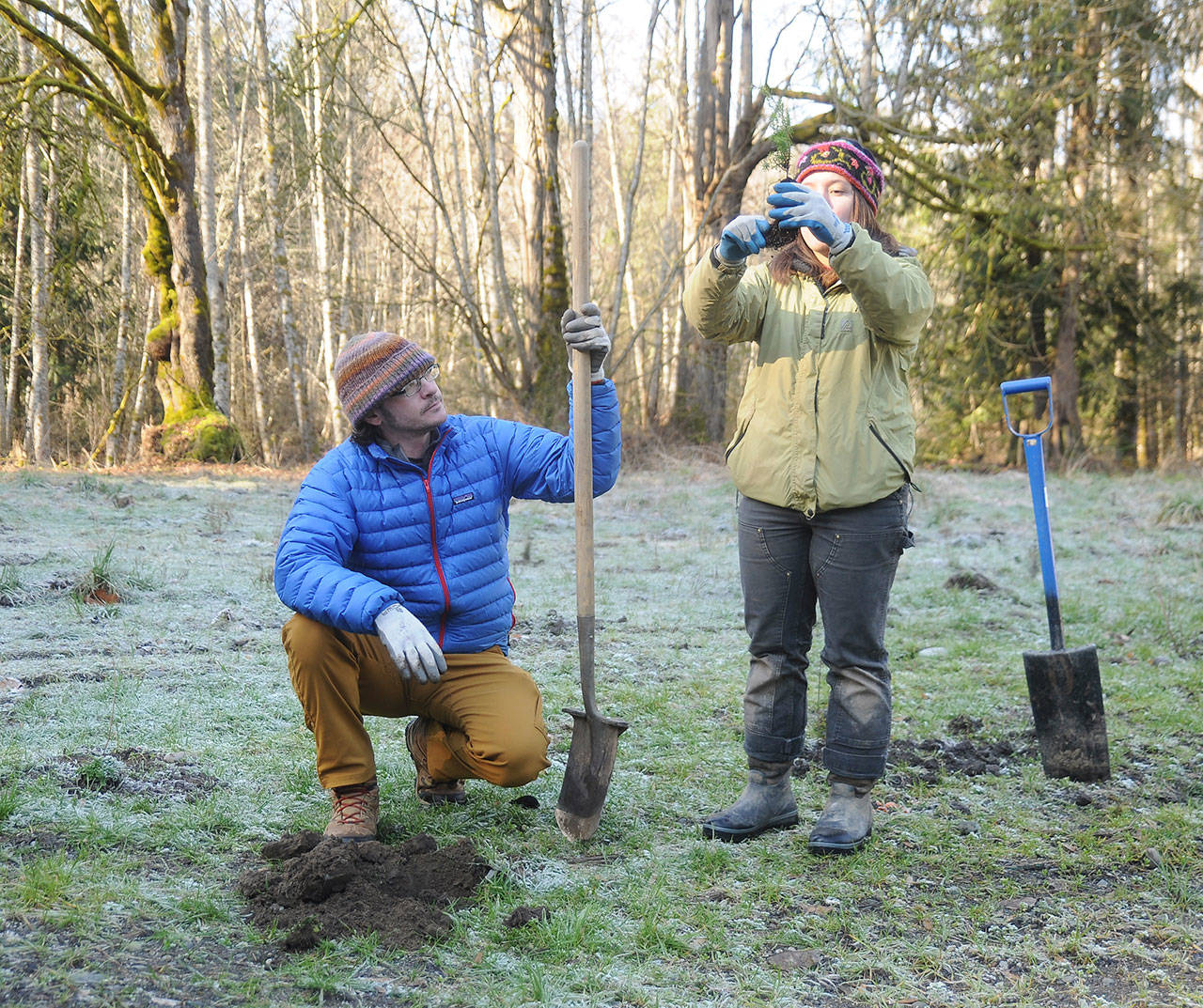The program has changed for the health of the volunteers. The events themselves are continuing for the health of the planet, according to the North Olympic Salmon Coalition.
The coalition is continuing efforts to restore native habitat with a series of “micro-plantings,” with small groups joining coalition volunteers and staff in planting native trees and bushes at key areas across the North Olympic Peninsula.
Traditionally, North Olympic Salmon Coalition (NOSC) tree plantings draw about 25 people per session, stewardship coordinator Nate Roberts said, so staff decided to offer two sessions per day to meet with the interest.
“A lot of our volunteers are itching to get out any way they can,” Roberts said. “Being outside and having conversation (with someone) is kind of a revelation in this day and age. (And) a lot of new people want to volunteer for the same reason.”
The next session, set for Saturday along the Dungeness River, will follow a number of COVID-19 safety protocols NOSC staff have put in place.
Reforestation will improve water quality on the Dungeness River and create healthy habitat for the fish and wildlife that frequent the area, NOSC representatives said. Trees and shrubs provide shade for fish, restores nutrients and reduces erosion, and the large woody debris that falls into the river creates eddies — important spots for young salmon.
The micro-planting will have two sessions — the first, from 10:30 a.m. to 12:30 p.m., the second from 1 p.m. to 3:30 p.m. — and will be limited to eight volunteers per session, with two NOSC staffers on hand.
All volunteers RSVP and sign a COVID-19 safety agreement, and on the day of the event undergo a brief health screening.
“In the morning we do a quick screening via telephone with each volunteer to make sure their temperatures aren’t elevated,” Roberts said.
Face coverings must be worn, and social distancing must be maintained during the event.
Participants are encouraged to bring their own gloves — NOSC will have pairs available to keep — and tools, though NOSC will have tools available to use and will sterilize them before and after plantings.
At micro-plantings earlier this year, including one on the Pysht River on Jan. 16 and on Kodama Farm near Chimacum, NOSC volunteers were able to set up individual plots to help space participants apart.
Alongside NOSC staffers, volunteers contribute hundreds of hours planting thousands of native plants to restore salmon and wildlife habitat, with a variety of trees such as Oregon ash, Pacific crabapple, western red cedar, grand fir and western hemlock, to shrubs such as red osier dogwood, oceanspray, snowberry, Nootka rose, Douglas spirea and red-flowering currant.
“This is good way for (people) to get out and volunteer and improve degraded habitat across the peninsula,” Roberts said. “It’s a great way to escape all the chaos.”
The COVID-19 pandemic did shut down or stymie some NOSC volunteer opportunities, Roberts said, but the coalition adapted.
For example, NOSC kept up monitoring of spawning salmon in Chimacum Creek with a reduced-sized group of regular volunteers; the move let the coalition bypass the traditional two-hour, in-person orientation for newcomers by using veteran helpers.
“We kind of stuck with volunteers who’ve done this for years in the past,” Roberts said.
NOSC also traditionally offers educational outreach for Peninsula schools; COVID forced much of that online, so NOSC began creating videos detailing degraded habitat in the region.
“We haven’t really skipped a beat with our other projects,” he said.
For more about NOSC micro-plantings, contact Lexi at outreach@nosc.org or 360-504-5611, and visit nosc.org/2021-plantings.

